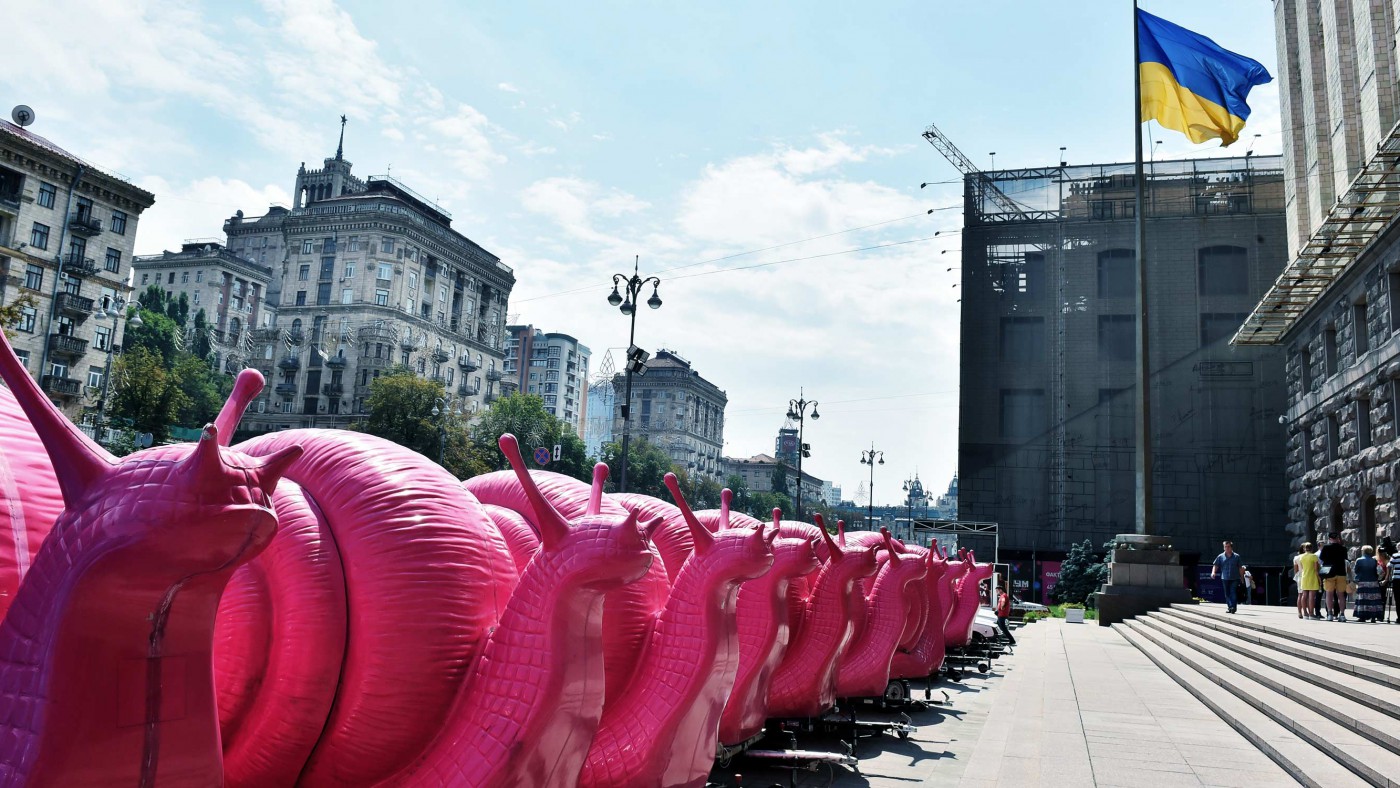It’s been half a year since I moved from Moscow to Kiev. I was a journalist for independent media in Russia, a member of a Moscow local council, and a civil rights activist. All those activities have become taboo — the Kremlin calls us “national traitors” on Russian TV, and many people believe it.
But as Putin’s neo-stalinism continues to infect Russian society, Ukraine is becoming more liberal. And we have Putin’s invasion partly to thank for it.
My grandparents live in Pavlograd, a small mining town in eastern Ukraine. I’ve visited them almost every year since my birth, and things there were always the same. The people spoke Russian, watched Russian TV, and sympathized with our common past. But now there is only an empty pedestal in the center of the town, where a Lenin monument used to stand. In the museum of local history, there is an exhibition devoted the Kyiv Euromaidan revolution, and the local volunteers who have defended eastern Ukraine.
There are still some relics of a shared Soviet past that unite Russian and Ukrainian people.
Both still regard entrepreneurs as enemies of the people. The mayor of Kiev is fighting against street coffee sellers to win more votes in forthcoming elections. This attitude is to be expected in a country where business was prohibited for seventy years.
But in Ukraine, people can fight back. In Kiev small business protested by bringing dozens of coffee vans to the city administration, using the slogan “We don’t steal, we work!” Unlike in Russia, standing up your liberty is encouraged in Ukraine.
Homophobia is another surviving Soviet tradition. This summer, despite the presence of 2,000 police officers, several dozen thugs attacked a gay pride march in Kiev, throwing smoke bombs and stones. They ended up injuring five policemen. A few days ahead of the LGBT march, the militant Right Sector movement had threatened to disrupt the event. But here too, there are signs of change.
Elton John recently took to the stage at a major political conference in Kiev to speak about gay rights. President Petro Poroshenko even gave his support to the Equality Rights march, declaring that citizens have a constitutional right to assemble, and that law enforcement agencies would guarantee their safety. This would not happen in Russia.
Two years ago when a famous “gay propaganda law” was passed, without debate, by the Russian parliament — as Russian State Duma speaker famously said, “Parliament is a no place for discussion” — human rights supporters, gay and straight, organized a kissing flashmob. We were attacked by orthodox activists who threw eggs and cursed at us. Police arrested kissing couples and set the violent extremists free.
After the law was passed — making it illegal to equate straight and gay relationships — my friends and I were beaten for “looking gay” in a bar in the center of the capital, owned by a representative of Moscow’s mayor. The attackers shouted “Burn in hell, faggots!” The security was virtually useless and refused to call the police when asked.
Three months later, my friend from St. Petersburg attended a weekly meeting for the LGBT community and was attacked by masked men. He sustained serious injury in one eye, after being shot with a pneumatic pistol.
The Russian investigators refused to search for the attackers. This is because, whilst police in Ukraine try to protect LGBT activists and arrest extremist thugs, in Moscow, it’s the opposite.
The liberal shift in Ukrainian public opinion is visible, and profound. Putin’s invasion of eastern Ukraine has been viewed as an attempt to restore the Soviet Union. This has brought back memories of soviet oppression, and Ukrainians have embraced liberal values in response.
Ukraine is no paradise. Living in Kiev is becoming less secure, the economic crisis has deepened, and the authorities responsible for reforming the country prefer speeches to action. But the people of Ukraine are a real political power, and the most reactionary government would have to heed this fact.
Here in Kiev I’m continuing with my work — promoting the same ideas, using the same language, and reaching out to the same audience.
The goal of my current project is to unite young people from the post-Soviet area. We are the first generation to grow up in these countries, since the fall of the iron curtain. The values of an open society—freedom of speech and of conscience, private property, open borders, priority of individual rights over state power—were outlawed for seventy years. While politicians are creating new borders and fueling hostility between us, we know we have a lot in common, both problems to solve and goals to achieve.
It’s not only the future of Ukraine that is being determined here. The events in Ukraine have a strong impact on the future of all post-Soviet states. If Ukraine succeeds, then Putin’s mix of neo-Stalinism and orthodoxy will no longer be an attractive alternative for the nostalgic minority who want to restore USSR, and me might have Putin’s hubris to thank for it.


